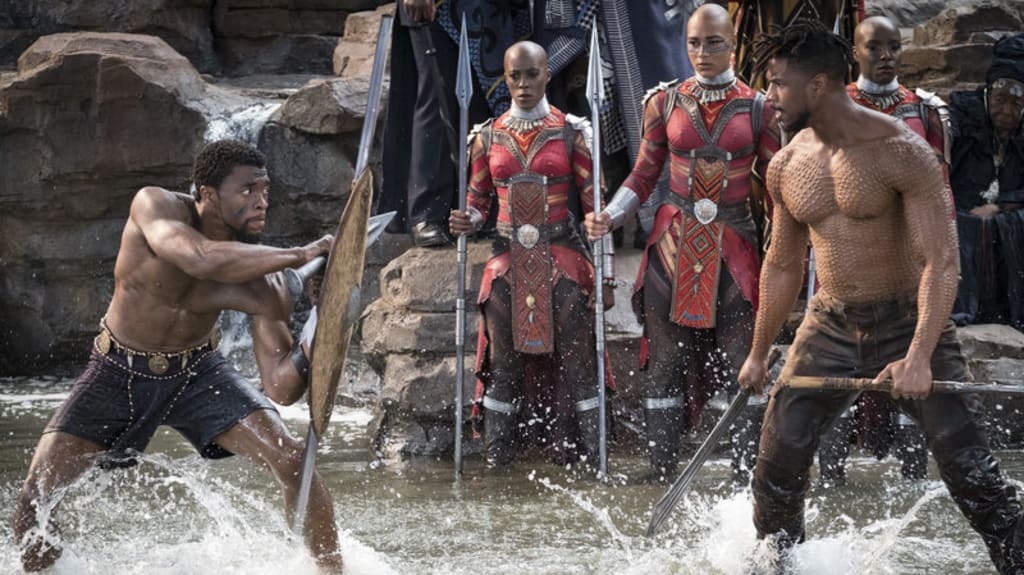Socialism, Revolution and Foreign Policy: A Black Panther Analysis
Originally published on Medium.com, March 27th, 2018.

Black Panther is one of the greatest comic book movies ever made. The film is rich with visual style, overflowing with culture, and completely immersive into a literally unseen world. This analysis of the film is somewhat spoiler-laden, assuming that the reader has seen the film and understands the plot. This analysis is more focused on the ideas, symbolism, themes, and philosophies in the movie. The YouTube channel Wisecrack has already explored some of the ideas in the film, and this analysis is an attempt to explore them further, build upon them, and explore other ideas that Wisecrack did not cover.
First, I must say that I don’t know much of the comic’s history. I do know that this film was written by both black and white people. The director, Ryan Coogler, is black, and wrote the main screenplay assisted by three others. But it also appears to be directly inspired by the historical Black Panther Party, as was the comic. The comic’s present writer, Ta-Nehisi Coates, is a black thinker, writer, and perhaps a socialist as well. As readers can come to expect from me and my ideas, there are socialist themes and ideas in the film worth analyzing and exploring. The Black Panthers were historically socialist and communist, and they dealt with many of the issues that black people in America presently face, in their collective experiences with crafting their sense of black identity and overall black culture within America.
Writers and philosophers who have already reviewed the film have examined the idea that isolationism and nationalism firmly represent the old guard of Wakanda, in Zuri, General Okoye, and T’Chaka. The new guard, the reformation of Wakanda into an international force, and is represented by characters such as M’Baku, Shuri, W’Kabi, and Killmonger and his father, with T’Challa philosophically and emotionally caught in the middle of this ideological war for the soul of Wakanda, as he grows into a king and decides how he should be.
His character arc is about how he chooses to be king. He has to choose between traditionalism, nationalism and isolation, versus modernity, humanitarianism and internationalism. The great thing about this is that the movie presents this philosophical struggle as both a conversation, and as a coup and resulting counter-coup. There is both thought and action here. T’Challa knows how much good Wakanda can do, but he tries to balance it with the need to protect and control the distribution, if any, of vibranium to the outside world.
The struggle between T’Chaka and Killmonger’s father is that debate. T’Chaka wants the old way, and Killmonger’s father, T’Chaka’s brother, wants a new way, but T’Chaka makes a terrible choice to kill his brother, in his mind to save Wakanda. That murder, that struggle, creates Killmonger. T’Chaka makes a haunting choice that nearly obliterates the Wakanda he loves. He is his own demise, philosophically. There is another distinction that needs to be made here between the national identity of Wakanda versus the racial identity of black Americans.
Wisecrack rightly points out that Killmonger’s identity is not nationalistic like Wakandans, but racially based. Killmonger’s life is built upon being black in a nation that still vilifies black people. America is a hostile nation to Killmonger, he is essentially a lone soldier in enemy territory. Wakandan nationalism is based in the understanding that if Wakanda is revealed to the world, they fear they may be colonized, enslaved or attacked. They, like North Korea, have a strong military and very powerful weapons to try to ensure Wakanda’s survival. This is very much like the ideas of Stalin if you will, it is very much “socialism in one country”, instead of internationalism in Trotsky. Those two historical figures, as well as their approaches to socialist theory, can be seen as intellectual symbols for the main philosophical debate in the film.
Killmonger is a soldier. He is a black man who has been “colonized” by the US military, and made into a weapon, a colonizer. In the eyes of black writers and thinkers like James Baldwin, Franz Fanon, W.E.B. DuBois, Cornel West or even the Black Panther comic’s writer Ta-Nehisi Coates, Killmonger’s blackness is stripped from him, turning him into an inhuman killer. The colonizers made him into one of them, killing the good man within him. The ritualized African scarification that Killmonger has is literally to mark his kills, but I would argue that this is also to try to “re-Africanize” him.
Ironically, the more he kills and the less human he becomes, Killmonger uses aboriginal African ritual to try to reclaim his humanity by tying himself to Africa, instead of the US. Killmonger is searching for his true home in Wakanda. He’s trying to find an identity and a home, a belonging in Wakanda. He knows America well, but America is not home for him, it’s basically one big warzone to him. War is all he knows, he’s almost a blind killer. But that pain in him is based in need, a need for roots. Everett Ross, the CIA man in the film, admits that they trained Killmonger in how to destabilize and destroy nations. That is partially what he is doing with Wakanda.
The political situation in Wakanda depicted by the film is very tenuous. Smugglers and thieves (like the secondary antagonist Ulysses Klaue) are trying to steal and transport vibranium out of Wakanda, and this is an indication that Wakanda, like all the rest of Africa, has been or is still in the process of being raped of its resources. Almost everyone in the film wants that to end, but they disagree about how. W’Kabi speaks to T’Challa about how Wakanda must change, maybe they should help black people worldwide, maybe they should, in a Leon Trotsky sense, export the revolution and liberate black people everywhere, by arming them and helping them protect themselves from systematic social abuses like police brutality. This is basically Killmonger’s plan, with an added dark twist.
Killmonger is portrayed incredibly sympathetically, and T’Challa is almost a stand-in for the audience, which is brilliant. The movie asks us what the right choice is. When Killmonger beats T’Challa and leaves him for dead, it is the symbolic destruction of the old ways, especially since he also kills Zuri, a living symbol of the old ways. Killmonger understands that the old ways need to die, and in the second sequence where T’Challa speaks with the spirit of his father, T’Challa realizes it too. He screams at his father, “you were wrong! WE were wrong!” When Killmonger takes the throne, his internationalism twists with his pain into an evil purpose. He believes in arming black people everywhere for a global revolution, but Killmonger wants to upend the historical abuses of Africa by recreating them on the white people of the world. He wants reverse slavery as revenge, expressed when he says, “this time we’re gonna be the ones on top!”
As an aside, the sociopolitical situation of the Jabari tribe is very interesting, because this situation starts to show the flaws in greater Wakandan society. The whole point was to subtly imply cultural supremacy narratives of the Wakandan people over the Jabari tribe. The Wakandan belief in their greatness is nationalism, not racism. They’re a flawed society whose flaws exist below the surface. They’re not meant to be portrayed as utopian. The treatment of the Jabari is a metaphor for racism, whereby T’Challa learns that he’s not responsible for past Wakandan mistreatment of Jabari, neither are the Jabari to be blamed, or worse eradicated.
They’re sort of like Switzerland. They are apart, they don’t participate in greater Wakandan society. They don’t have the same god, the same magic, and I don’t believe they have access to vibranium either. To use another political metaphor, if Wakanda is the US, then the Jabari are Canada, in that their two nations are connected by geography, but still separate. The Jabari are kind of like a vassal tribe. They’re not really recognized or respected by Wakanda. I get the feeling in the film that M’Baku challenging T’Challa was sort of like, ironically, a Black Panthers against the US thing. The Jabari tribe recognizes that Wakanda is more or less hostile, but not hostile enough to warrant war.
It could be seen as a kind of an apartheid state where the Jabari are separated, second class, the exception to the rule of law. Imagine if the Warsaw Ghetto decided that Imi Lichtenfeld needed to fistfight Hitler to stop that separation. By M’Baku making the challenge to Wakandan society, he was challenging that legal and cultural separation, possibly in order to earn the right to incorporate themselves and be recognized by Wakandan society. The Jabari tribe are not citizens of Wakanda, not recognized. They’re a hostile, lower class of people who want to challenge what they see as an elitist, separatist Wakandan state.
T’Challa stopping Killmonger is about stopping totalitarianism, expressed in global slavery. As T’Challa says to M’Baku after M’Baku saves his life, neither of them are responsible for the past, and they all need to let it go. More than a symbolism for both white and black communities moving on from the abuses of the past and out from under the shadow of racism and slavery to make amends for what terrible wrongs have been done, it’s also character development for the both of them. T’Challa learns to respect M’Baku, and M’Baku begrudgingly begins to accept T’Challa. They’re moving on from the abuses of the past.
In that way, Killmonger can’t. This is symbolized by his dream sequence, where Killmonger relives his father’s murder. That pain is why he can’t grow. He has fed it with years of slaughter, not eased it. He’s a monster that T’Chaka and the CIA both made, but he also made himself this way in the military with his choices. There are multiple reasons why he destroys the garden of the heart-shaped herb. One, to prevent anyone else from having the power of the panther spirit. Two, to destabilize Wakanda and make it malleable, either for destroying it or essentially becoming a dictator. I really like the idea that Killmonger’s symbol is the jaguar; it’s both a comic book nod, and to differentiate Killmonger philosophically and spiritually from T’Challa. On an interesting side note, Africa and Asia are home to black panthers, whereas jaguars are more common in North America. This could be deliberate, choosing an African native predator to symbolize T’Challa, and an American counterpart for Killmonger.
In the end, T’Challa beats Killmonger, but Killmonger still kind of wins, because he did what no other Marvel villain has ever done; he changed the hero’s mind. These good versus evil tropes always paint the hero as uncompromising, and right by definition. But T’Challa realizes that everything his father taught him was wrong, he rejects it, and changes. But he also does what nobody else could ever do, he defies both Killmonger and his father by choosing a middle path, an Aristotelian golden mean, a Buddhist Golden Path, between two extremes.
In the end, T’Challa chooses a Wakandan foreign policy of diplomacy, compromise and humanism, offering outreach and diplomacy with the outside world, to help the world instead of taking it over, or staying hidden. When T’Challa offers to spare Killmonger’s life, Killmonger states that he’d rather die free than be a slave. TChalla obliges him out of respect. This movie is revolutionary because it takes a serious, philosophical, and empathetic look at black revolution from a socialist perspective. It is subversive, it is stylish, and it is awesome. I love this movie.
About the Creator
Johnny Ringo
Disabled, bisexual American socialist and political activist. Student of politics, aspiring journalist, and academic. Bachelor’s of Science in Criminal Justice.






Comments
There are no comments for this story
Be the first to respond and start the conversation.